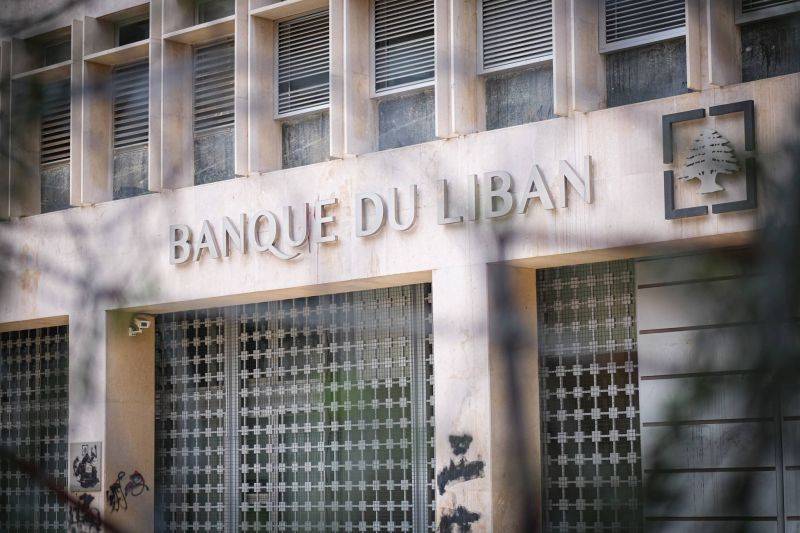
The central bank claims it has a plan to repay in foreign currency up to $25,000 per depositor over an undetermined period of time. (Credit: João Sousa/L’Orient Today)
BEIRUT — Banque du Liban has launched “an initiative” to gradually repay foreign currency deposits made before the Oct. 17 uprising, the bank’s media office announced Sunday evening, without disclosing from where it would source the dollars needed to fund this program.
The central bank claims it has a plan to repay in foreign currency up to $25,000 per depositor over an undetermined period of time. The plan also entails repaying the same amount’s “equivalent in lira,” suggesting that depositors would recoup up to a total of $50,000 of their funds lodged in Lebanon’s commercial banks before Oct. 17, 2019.
However, BDL did not indicate at what exchange rate it intends to calculate this “equivalent in lira” sum: the official dollar peg of LL1,507.5; the bank platform rate of LL3,900; the parallel market rate, which is currently LL12,500; or a fourth rate calculated especially for this transaction.
Withdrawal of “these sums will be divided into installments over a period to be determined by the central bank soon,” BDL’s press office said.
The payment will take place in multiple installments over three years, a senior commercial banker told L’Orient Today on condition of anonymity.
In November 2019, Lebanese commercial banks implemented “exceptional temporary directives” that imposed informal capital controls on depositors, restricting their access to money deposited in Lebanese commercial banks. These controls began by limiting transfers overseas and were extended to the point of completely stopping US dollar withdrawals in April 2020.
Dollar deposits in banks are currently withdrawable at a rate of LL3,900 on amounts up to $5,000 per month and at the official peg of LL1,507.5 to the dollar thereafter. The lira is now trading at LL12,500 to the dollar on the parallel market, thus banks’ clients continue to receive haircuts on their deposits while withdrawing a depreciating currency.
BDL said it expects dollar payments under its new plan to begin on June 30, but only if “legal coverage” is obtained.
MP Nicholas Nahas (Azm/Tripoli), deputy head of Parliament’s Budget and Finance Committee, told L’Orient Today that the term “legal coverage” refers to the capital control draft law being prepared by the committee, which would allow dollar depositors to withdraw half of their monthly withdrawal limit — which the draft sets at LL20 million — in cash dollars. The draft law offers no indication of what exchange rate would be offered on the LL10 million withdrawable in cash dollars.
Nahas also indicated that the dollar repayment plan had been announced prematurely, saying “[BDL’s] governor got ahead of events and rushed to announce it, although these withdrawals are still subject to discussion.”
It is estimated that executing the repayment plan would require about $14.5 billion over three years to cover up to $25,000 per depositor, the senior banking source said.
Where will the money come from?
BDL’s dwindling foreign currency reserves are now being used to subsidize imports of wheat, fuel and medicine at the official peg, as well as a food basket and agriculture and industrial commodities at BDL’s platform rate.
The subsidy program may no longer be viable as early as the end of this month, caretaker Finance Minister Ghazi Wazni said in April, because BDL’s reserves are dropping towards the mandatory level — a minimum of 15 percent of banks’ deposits that must be kept at BDL. BDL Gov. Riad Salameh has repeatedly said these dollars will remain untouched.
Wazni estimates the mandatory reserves level at $15 billion.
In executing the proposed capital control law, Budget and Finance Committee chair MP Ibrahim Kanaan (FPM/Metn) also aims to keep the mandatory reserves intact. Therefore, the committee suggests that banks use their dollars at correspondent banks abroad to cover all dollar requests.
However, Lebanon’s commercial banks combined do not hold enough money to cover these operations since they have a net negative position abroad. They are short on foreign currency, according to Salim Sfeir, head of the Association of Banks in Lebanon.
The only available source left is the funds that some banks brought into the country by BDL’s February deadline to recoup a small portion of money transferred abroad, the banking source said. This point was echoed by Dan Azzi, a financial expert, who tweeted that banks may have to “pay out of their 3 percent which they do not have or cannot pay out.”
In August, BDL issued a circular ordering banks to recapitalize by February and asking them to partly recoup funds transferred abroad. Banks had to accumulate 3 percent of the total foreign currency deposits registered in their books and place them in foreign correspondent banks.
The circular also requests that commercial banks “urge” any customer who transferred more than $500,000 abroad between July 2017 and August 2020 to deposit in a five-year term “special account” an amount equivalent to 15 percent of the transferred value. Banks’ directors, shareholders and politically exposed persons were to be asked to repatriate 30 percent rather than 15 percent, according to the circular.
If these funds were successfully repatriated, banks would accumulate some $3.7 billion, but under the terms of the funds’ repatriation, banks would be obliged to pay this sum out to its depositors in five years’ time.
The goal of the August circular is to “reactivate the work of banks operating in Lebanon and facilitate foreign operations that stimulate the national economy,” according to BDL.
Whether banks were able to repatriate this money or not remains unknown, George Abi Saleh, a spokesperson for ABL, told L’Orient Today.